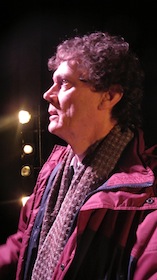Morning and Afternoon consists of two interconnected monologues written and performed by Andy Hinds. Both pieces involve men at a moment of personal crisis where they begin to reflect on their lives and to meditate on existence. In its form and subject matter the piece thus invites comparison with the wealth of Irish monologue plays that premiered on stages in the 1990s. Unfortunately, in such comparisons Hinds work falls far short of the immediacy, inventiveness, and poignancy of the work of playwright’s such as McPherson and O’Rowe.
The first monologue introduces us to the character of Niall revealed to be a Derry born man living in Germany. He is waiting in the morning time to hear news on his pregnant and terminally ill wife who has gone into premature labour after they have fought. He tells of his childhood spent living in an insular Derry where his cruel Father does not understand his love of classical music. He speaks of his subsequent inadequacies at expressing emotions which he believes he learnt as a child in order to cope with his father’s abuse. He mentions his brother Danny and seeks to reconnect with his estranged brother.
As an audience we invest in the story as we are made curious by the writing in the tension created by the situation.
In the second monologue we find the wayward Danny pausing in the afternoon to reflect before once more embarking on another journey. We hear of his plight in Derry where he is unable to get a job and is forced to emigrate. Full of bitterness that he was forced to leave never to find a lasting home elsewhere, he confides in the audience how his decision to exile himself was prompted by his unhappy relationship with his abusive father. His anger and despair at his lonely lot in life as a journeyman labourer is conveyed to us. His anguish leads to a hunger to track down his brother – the only person left with whom he may be able to relate.
 Danny’s monologue lacks the dramatic momentum of the first piece, as his situation does not have the same force and pressure. As a character, Danny’s life is less complex than Niall’s and much of the interest in this story is generated by how it develops Niall’s narrative from the earlier monologue.
Danny’s monologue lacks the dramatic momentum of the first piece, as his situation does not have the same force and pressure. As a character, Danny’s life is less complex than Niall’s and much of the interest in this story is generated by how it develops Niall’s narrative from the earlier monologue.
Paul Kennedy as director has Hinds planted onstage with little movement. If Hinds had perhaps moved closer to the audience or around the stage space more interaction and intimacy with the audience may have been achieved.
The stage was bare save for a hanging cloth. The lights (operated by Colm McNally) were simple and without much colour, they dimmed and brightened according to the changing moods of the different sections of the monologues. The cloth seemed unnecessary – it did not give a sense of place and only served to break up the darkness of the black box theatre. More colours and a more complex lighting design may have added more expression to the emotions contained within the writing.
Hinds is assured and impressive in his delivery of both monologues and manages to make the two brothers very different in his performances. He embodies Niall’s hesitancy and fearfulness in presenting a tense figure that finds release at times with oddly frantic hand movements. As Danny he presents himself as physically strong and bullish, which suited this character whose life is described in terms of constant confrontation.
The writing aims to show us the sublime in the ordinary, the drama of mundane characters. Old worn themes of Irish theatre are rehearsed: the psychological displacement of emigration, Irishmen’s inability to express themselves and the damaging residual effects of domineering father figures. In this the play does not break any new ground, failing to make such concerns fresh or resonant. The lyrical passages also lack novelty; they are full of tired images of sunrises and sunsets alluding to hope and the beauty of the world.
But the writing in terms of storytelling functions well: Hinds holds back just enough details in order to keep us interested in the unfolding story of these men’s lives. However, while these characters are sympathetic, they are not sufficiently singular in actions or vision of life to challenge or inspire. This production does not usher in a new dawn for the Irish monologue play but instead dwells in its shade like a pale Irishman might from the burning heat of summer noon day sun.
Ian R. Walsh is Lecturer in Drama at University College Dublin and has recently published his first book Experimental Irish Theatre: After W. B Yeats (2012)